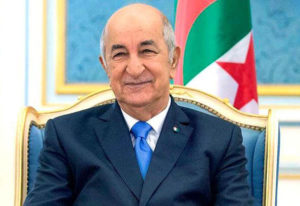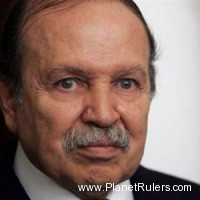Abdelmadjid Tebboune, President of Algeria (Elected on Dec 12, 2020 with 58.1% of the vote)
 Abdelmadjid Tebboune (born 17 November 1945) is an Algerian politician currently serving as the President of Algeria since December 2019 and as Minister of Defence. He took over the power from former President Abdelaziz Bouteflika and former Acting Head of State Abdelkader Bensalah. Previously, he was Prime Minister of Algeria from May 2017 to August 2017. In addition, he was also Minister of Housing from 2001 to 2002 for a year and again from 2012 to 2017 for 5 years.
Abdelmadjid Tebboune (born 17 November 1945) is an Algerian politician currently serving as the President of Algeria since December 2019 and as Minister of Defence. He took over the power from former President Abdelaziz Bouteflika and former Acting Head of State Abdelkader Bensalah. Previously, he was Prime Minister of Algeria from May 2017 to August 2017. In addition, he was also Minister of Housing from 2001 to 2002 for a year and again from 2012 to 2017 for 5 years.
On 3 November 2020, during the pandemic in Algeria, it was reported that Tebboune tested positive for COVID-19 and was admitted to a hospital in Germany for treatment. On 29 December 2020, Tebboune returned to Algeria after finishing treatment.
Abdelkader Bensalah, Former President of Algeria
 Born 24 November 1941, Abdelkader is an Algerian politician who serves as President of the Council of the Nation since 2002 and as acting head of state following the resignation of Abdelaziz Bouteflika in April 2019. Bensalah will run Algeria for a period of 90 days during which a new presidential election will be held. Abdelkader Bensalah was officially born on 24 Novembre 1941 in Felaoussene, close to Tlemcen (French Algeria).
Born 24 November 1941, Abdelkader is an Algerian politician who serves as President of the Council of the Nation since 2002 and as acting head of state following the resignation of Abdelaziz Bouteflika in April 2019. Bensalah will run Algeria for a period of 90 days during which a new presidential election will be held. Abdelkader Bensalah was officially born on 24 Novembre 1941 in Felaoussene, close to Tlemcen (French Algeria).
Persistent rumours, which he regularly denies, suggest he was born in Morocco and became an Algerian citizen after the Algerian War of Independence. After working in Beirut to direct the Algerian Center for Information and Culture from 1970-1974, he returned to Algeria to work as a journalist at the state newspaper El Chaâb for three years, before being elected to represent the province of Tlemcen in 1977. Twelve years later, he was appointed Ambassador to Saudi Arabia, a position he held until 1993. As a member of the centrist Democratic National Rally (RND), he was President of the National Transitional Council from 1994 to 1997 and of the People’s National Assembly from 1997 to 2002. Since July 2002, he has served as President of the Council of the Nation, the upper house of parliament. He replaced Abdelaziz Bouteflika for some presidential duties, like welcoming foreign leaders to Algeria, during the last part of the former President’s tenure. He was a strong ally of the latter, supporting his fifth candidacy even during the 2019 Algerian protests. As provided for under article 102 of the Algerian Constitution, he became acting head of state of Algeria on 9 April 2019, seven days after the resignation of Abdelaziz Bouteflika. His term can last for a maximum of 90 days while the presidential election is held. By law, he cannot participate in this election.
Source: https://en.wikipedia.org/wiki/Abdelkader_Bensalah
Abdelaziz Bouteflika, Former President of Algeria (re-elected on Apr 17, 2014; resigned on Apr 9, 2019)
 1937 March 2: Born in Oujda (today Morocco) to a father of origin in Tlemcen.
1937 March 2: Born in Oujda (today Morocco) to a father of origin in Tlemcen.
1956: Bouteflika finishes his secondary education, and joins the ALN (Armée de libération nationale), which is part of FLN.
1957: Starts serving as officer, working specifically out of Oujda, not participating in fights.
1960: Is stationed in the southern regions of Algeria.
1961: Participates in a secret Algerian delegation to Aulnoy, France, in order to negotiate with the French authorities.
1962: With the birth of Muslim independent Algeria, Bouteflika is appointed Minister of Youth, Sport and Tourism.
1963: Bouteflika is appointed Foreign Minister, at the age of 26.
— Bouteflika also becomes member of the legislative assembly.
1964: He is elected for the congress of the FLN.
1979: After serving as foreign minister under two different presidents, Ahmed Ben Bella and Houari Boumedienne, Bouteflika finally has to resign from his post.
1981: Bouteflika goes into exile, after being charged with corruption. The case is later dropped.
1987 January: Bouteflika returns to Algeria.
1988 October: Bouteflika signs a protest against the ruthless acts by government troops against young protesters.
1989: He participates in the FLN congress, and is elected to the central committee.
1998 December: Declares that he will run for president with the next elections.
1999 April 15: Elected president with 73.8% of the votes, after all the other candidates withdrew in protest. French figures (Le Monde) gave Bouteflika only 28% in an election with 23% turn-out. The elections are met with international criticism and internal protest in the days following. Out of 47 candidates, 7 were permitted to run for election. 6 of them would withdraw so close to the election, that the ballots could not be changed. They all, therefore, received votes.
— August 1: Bouteflika declares that he will put an agreement between the government and FIS up for a referendum on September 16.
— December: Establishes a new government, with Ahmed Benbitour as prime minister. The government had members from the 7 political parties that had supported Bouteflika in the presidential election.
2001: Following the arrest and killing of a high school student in Kabylia, widespread riots break out in Kabylia. The protests, Black Spring, brings forth several large demonstrations in Algiers, the largest with 500,000 participants.
2004 April 8: Bouteflika is reelected in presidential elections, winning 83.5% of the votes. The election is called fair by international observers, but is boycotted by the Kabyles.
— Introduces a National Reconciliation Plan, offering amnesty to many combatants in the Algerian Civil War.
— Becomes president of the Arab League, a term that would last one year.
2005 November 26: Hospitalized for 3 weeks.
2006 May 25: Appoints Abdelaziz Belkhadem new prime minister. He also announced a change in the constitution to allow the president to remain in office indefinitely.

